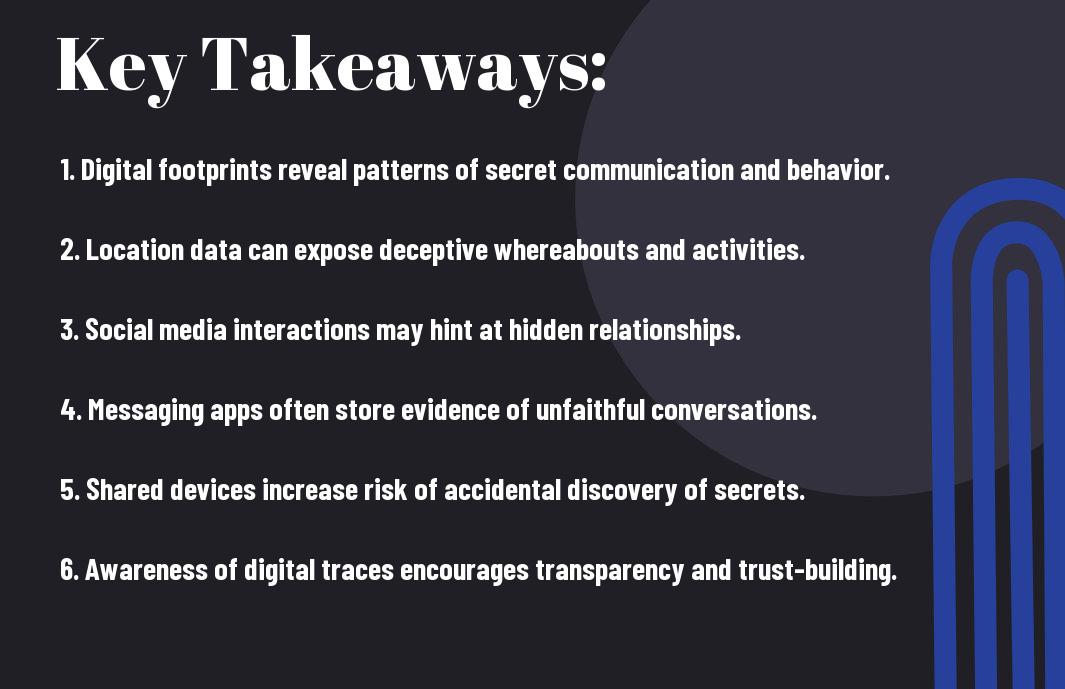Many people are unaware of how their digital footprints can expose unfaithfulness in relationships. In today’s tech-driven world, every click, message, and social media interaction leaves behind a trace that can unveil a partner’s deceit. By understanding these technological markers, you empower yourself to recognize signs of infidelity that may otherwise go unnoticed. This post will investigate into the various ways technology can reveal hidden betrayals, helping you navigate your relationship with a more informed perspective. Get in touch with Digital Forensic Squad to learn more about how digital footprints reveals infidelity and how you can utlize it effectively.
Key Takeaways:
- Digital footprints, such as social media activity, text messages, and online interactions, can provide significant insights into a partner’s behavior and relationships, potentially revealing signs of infidelity.
- Technological advancements have made it easier for individuals to communicate discreetly, leading to challenges in trust and transparency within modern relationships.
- Maintaining open communication and setting boundaries regarding technology use can help partners navigate potential issues related to digital footprints, fostering a healthier relationship dynamic.
Understanding Digital Footprints
Before diving deep into the intricacies of modern relationships, it’s imperative to grasp the concept of digital footprints. Your online activities create a trail that could unveil unsettling truths about relationships. As detailed in The Rise of Digital Betrayal: How Technology Is Fueling …, technology plays a significant role in exposing infidelity.
Definition and Scope
Around the digital landscape, every interaction leaves a trace. Your emails, social media posts, and search histories contribute to what is collectively known as your digital footprint. Understanding this concept can unveil patterns and behaviors that might be telling you more than you realize about those around you.
Types of Digital Footprints
An array of digital footprints exists that can be categorized to help you understand what they reveal about your relationships:
| Type | Description |
| Active | Footprints created when you intentionally share information online. |
| Passive | Data collected about you without your knowledge, such as cookies. |
| Social | Interactions on social media platforms that can reveal your interests. |
| Browsing | Your online searches and the websites you visit. |
| Mobile | Data collected through your smartphone apps and location services. |
The diversity in these types makes it easy for individuals to inadvertently expose their activities and intentions, especially if infidelity is in question.
Expanded Discussion on Types of Digital Footprints
But it’s vital to comprehend how your digital presence can impact your relationships. Each footprint serves as a piece in the puzzle of your connectivity:
| Type | Impact |
| Social | Reveals emotional connections through your interactions. |
| Browser | Shows your interests, which can assist in discovering secrets. |
| Mobile | Location data can expose habits and unexplained absences. |
| App Usage | Indicates preferences and potential hiding behaviors. |
| Search History | Can provide insight into concerns or inquiries regarding fidelity. |
The clarity or confusion in understanding these footprints may determine the pathways of your romantic experiences.


Technology’s Role in Relationship Monitoring
Assuming you are in a relationship, technology now plays an integral role in how partners monitor each other’s behaviors. With the rise of various digital platforms, you may find yourself checking your partner’s online activity, which can lead to both trust issues and transparency. This technological oversight can create a double-edged sword where the very tools that connect you also contribute to feelings of suspicion and anxiety about fidelity.
Social Media Scrutiny
Relationship dynamics can easily shift with social media, as your partner’s online interactions are often put under a microscope. You might start analyzing their posts, comments, or even likes, leading to unnecessary jealousy or doubt. The digital space, while a way to connect, also opens the door to misinterpretations, leaving you feeling insecure about the relationship.
Messaging Applications and Privacy
Monitoring your partner’s digital communications can be tempting, especially with the privacy features embedded in messaging applications. However, your desire to scrutinize may also reflect deeper issues within your relationship. You might find yourself grappling with concerns about what your partner is discussing, creating unnecessary tension.
In fact, many messaging platforms like WhatsApp and Signal prioritize end-to-end encryption, making it difficult for you to access your partner’s chats without their consent. While this is a great feature for privacy, it can also lead to feelings of mistrust if you suspect that they are hiding something. The lack of transparency on these platforms can prompt you to question their loyalty, as you feel left out from conversations that might be significant to your partner’s social life.
Common Signs of Infidelity in Digital Behavior
Unlike previous generations, where infidelity was often revealed through physical signs, today’s digital landscape can unveil hidden betrayals. You may notice an increase in digital secrecy, shifts in communication patterns, or the use of encrypted messaging apps. For insights on addressing these modern challenges, explore Navigating Infidelity in a World with Technology, where you can find strategies to safeguard your relationship.
Increased Secrecy
Against the backdrop of your relationship, you might sense heightened secrecy from your partner, particularly concerning their phone or social media use. They may frequently change passwords or become defensive when asked about their online activities, signaling a potential breach of trust that you should address.
Changes in Communication Patterns
Digital communication can significantly alter how you interact with your partner. You may witness them spending more time on their devices, leading to less face-to-face interaction. Frequent late-night texting or sudden shifts in who they communicate with can also serve as red flags, indicating something may not be right.
Communication channels that were once open may start to feel strained or distant. You might notice your partner initiating conversations less frequently or avoiding discussing their day. These shifts can hint at emotional detachment or the presence of another source sparking emotional conversations. Pay attention to these changes, as they can be indicative of deeper underlying issues in your relationship.
Tools and Technologies Used to Detect Infidelity
Now, in a world dominated by technology, identifying infidelity has become more advanced and accessible. Various tools are available to help you uncover potential deceit in your relationship. From specialized software applications to surveillance methods, understanding these technologies can empower you to make informed decisions about your partner’s fidelity.
Apps and Software Solutions
The rise of apps and software solutions offers unprecedented insight into your partner’s digital behavior. Programs designed to monitor text messages, social media activity, and location data can reveal patterns that may raise red flags in your relationship. By utilizing these tools, you can better assess the state of your partnership.
Surveillance and Tracking Methods
Besides technology applications, surveillance and tracking methods are employed by those looking to confirm suspicions of infidelity. These techniques include GPS tracking, hidden cameras, and other monitoring devices that provide irrefutable evidence regarding your partner’s whereabouts and behavior.
Even basic surveillance measures, such as GPS tracking, can help you monitor your partner’s movements discreetly. With access to location history and real-time updates, you gain insights into their daily activities that may seem suspicious. These methods, while raising ethical questions, can deliver the clarity needed to address your concerns directly and understand your relationship dynamics better.
Ethical Considerations and Privacy Issues
Your use of technology in relationships raises significant ethical questions and privacy concerns. While tracking digital footprints can unveil infidelity, it is necessary to consider the implications of invading your partner’s privacy. Striking a balance between vigilance and trust is key, as the methods employed to gather information can lead to breaches of trust and potential legal repercussions.
Consent and Trust in Relationships
Between partners, consent and trust are foundational elements that shape the dynamics of a relationship. If you resort to monitoring your partner’s activities without their knowledge, it can severely damage the fabric of trust that binds you together. Open communication about boundaries and expectations regarding privacy can help foster a healthier relationship, minimizing misunderstandings and insecurity.
Legal Implications of Monitoring
Before you engage in any form of monitoring your partner’s digital behavior, it’s important to be aware of the legal implications involved. Using tracking apps or surveillance methods without consent may violate privacy laws, leading to legal challenges or repercussions. Taking proactive steps to ensure that your actions are legally compliant is vital to avoid potential disputes and to maintain ethical standards in your relationship.
Relationships can become complicated when one partner feels the need to monitor the other’s activities. Specific laws vary by location, but digital surveillance often falls under privacy regulations that protect individuals from unauthorized monitoring. Educating yourself about the legal boundaries surrounding consent and privacy rights is necessary to navigate this sensitive terrain responsibly. Ensuring both partners are informed and agree upon their privacy expectations can help avoid legal entanglements while fostering an environment of trust and respect.
Navigating the Aftermath of Discovery
Keep in mind that discovering infidelity can be overwhelming, and how you handle the situation greatly impacts your emotional well-being and the future of your relationship. Take the time you need to process your feelings and consider seeking support from trusted friends or professionals. Open communication with your partner is important as you both navigate this challenging phase together.
Addressing Infidelity
With transparency as a foundation, initiating a conversation about the infidelity can help both of you understand the circumstances and underlying issues that led to the betrayal. Approach this discussion with an open mind, allowing both parties to share their perspectives. This can foster an atmosphere of understanding necessary for moving forward.
Repairing Trust and Relationships
Along the journey of healing, it’s vital to actively work on rebuilding trust and restoring your connection. This process takes time and effort from both partners, but setting clear expectations and boundaries can help. Be willing to engage in difficult conversations and demonstrate consistent positive changes.
In addition, establishing a routine of open dialogue can deepen your bond and encourage honesty moving forward. Honoring feelings, taking accountability for actions, and being patient with one another is important. You may want to set aside regular check-in times, ensuring both partners feel heard and valued, ultimately paving the way for a healthier and stronger relationship post-infidelity.
To wrap up
Hence, understanding digital footprints in the context of modern relationships is imperative for you as technology continues to evolve. Your online behaviors, from social media interactions to app usage, can inadvertently expose signs of infidelity. By being conscious of your digital presence, you not only protect your relationship but also create a more transparent environment that fosters trust and communication. Keeping these insights in mind allows you to navigate the complexities of love in a digital age effectively.
FAQ
Q: How can digital footprints indicate infidelity in relationships?
A: Digital footprints can reveal a person’s online activities, such as text messages, social media interactions, and browsing history. When one partner engages in secretive communication or visits suspicious websites, it may suggest infidelity. This data is often tracked through location services, app usage, and online behavior, leading to potential discoveries of unfaithfulness.
Q: What common signs of technology-related infidelity should I look for?
A: There are several indicators that may suggest a partner is hiding something due to their digital behaviors. These include frequently changing passwords, increased privacy settings on devices, keeping their phone close at all times, or showing signs of anxiety when asked about their online activities. Additionally, irregular usage patterns, such as late-night phone calls or sudden secrecy about social media accounts, can also be a cause for concern.

